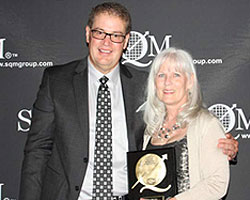
World Class Csat Certification for Agents and Supervisors
SQM research shows that call center recognition practices are one of the lowest-rated attributes by front-line Agents. Only 35% of Agents are very satisfied with their center's recognition practices.
In today's multi-channel world, where 31% of calls into the contact center result from failed previous attempts, Agents are required to be ever-ready problem solvers and advocates for the customer. It's even more vital that your Agents stay motivated when you consider that from the Agent's point of view, almost every third call they receive is one where the customer is starting with a negative experience.
So the challenge is on for leaders to provide more meaningful and motivating recognition. Our experience is that giving the voice of the customer (VoC) feedback to the Agent and Supervisor gives them actual "wow" feedback from a satisfied customer is vital. And equally, the non-sugar-coated feedback from dissatisfied customers is valued as a trustworthy and unbiased source for improvement insight.
The vast majority of SQM's clients manage their survey quota so that every Agent they have receives a set volume of surveys every month. For example, SQM recommends a quota of 10 surveys per Agent per month so that 120 are collected in a year, which is a statistically sound sample. This seemingly simple approach to surveying is a game-changer in having the Voice of the Customer as a core component for Agent and Supervisor scorecards, coaching, and recognition. And the recognition component is leveraged into a World Class Certification program for Agents and Supervisors.
Why aren't Agents and Supervisors typically held accountable to the Voice of the Customer?
When it comes to metrics for the customer experience, it is often only the management team that has a direct VoC score included in their accountabilities. So why does the VoC accountability not get applied at the Agent and Supervisor levels within the organization? The most common reason we hear is that when surveys are collected on a randomized basis, it is impossible to collect an equal quota of surveys for each Agent.
With uneven survey collection, many contact center leaders are reluctant to introduce accountability when one Agent receives two surveys, and another receives 20. That concern is valid but leads to a wasted opportunity! A whopping 92% of organizations invest in measuring the customer experience for live call center channel transactions, but a fraction of those organizations can leverage that survey work to provide an accurate customer experience measure of performance at the Agent and Supervisor levels.
The dangers of using Quality Assurance (QA) as a proxy for VoC
We see many organizations try to use QA scores as a proxy for the VoC. However, SQM would strongly argue that QA cannot and should not be used as a proxy for the VoC. Simply, QA is the voice of the organization and is measured by QA evaluators who are trying to judge what each customer may have experienced on their call. Using QA to judge customer experience is fundamentally flawed. For example, imagine the waiter telling you what you think of their meal! That's likely to cause some tension in an otherwise romantic evening!
Performance opportunities at the Agent level
Our research shows that one of the most compelling justifications for creating Agent accountability lies in the difference between 1st and 4th quartile Agent performers. For example, the graph below shows a 15% performance gap on-call resolution between 1st quartile and 4th quartile performance. This difference is even more pronounced if you look at the top 10% of Agents performing at 97% call resolution versus the bottom 10% of Agents performing at 77%. And, it is essential to note that this data is based on Agents handling the same mix of call types.

An enormous gap between top and bottom performers has prompted us in the past to say that it is worth encouraging your lowest 10% of performers to stay home! But, of course, SQM encourages organizations to identify these poor performers using customer survey data and then work with them to improve performance proactively.
We have seen the entire organizational culture shift to customer-centric when these poor performers are identified and coached intensively. The most effective practice for a cultural change is when the Agents who don't improve are managed out of the organization.
In our experience, those organizations that do crack the nut of Agent accountability are the ones that stand the best chance to improve the customer experience. This is done by driving performance accountability at the low-performing end of the spectrum and by recognizing and encouraging world class performance at the top-performing end of the spectrum.
We have worked with organizations that have improved FCR by 5% in as little as 60 days by introducing accountability at the Agent level. This accountability is based on every Agent receiving 5-10 surveys per month with performance judged by VoC.
Dramatic performance improvement based on VoC accountability
SQM is proud that there were 15 organizations honored this year with an FCR Improvement award resulting from improving their FCR by 5% or more year over year. This is an enormous achievement, bearing in mind that for the average call center of 300 seats, a 1% improvement in FCR corresponds to a $286,000 annual operational savings.
Most of these organizations has employed the surveying methodology of collecting survey quota at an Agent level, which has enabled them to employ a VoC performance management system that includes: fully
- A set of accountability metrics based on VoC – e.g., call resolution, customer satisfaction
- Performance reporting where each Agent, Supervisor, and Manager can log on and see their survey results and where they rank within the organization
- An improvement plan where the 10% to 15% of Agents who are performing poorly on the VoC metrics are identified and then put on a VoC performance improvement plan to assist in improving performance
- Performance appraisals include VoC feedback and overall Agent performance as judged by their customers
- Compensation pay based on VoC performance, including merit pay increases as well as bonus and recognition payouts
Applying these VoC performance management principles was fundamental to our 15 FCR Improvement award winners to give them the dramatic and financially rewarding improvement in FCR.
Agent and supervisor VoC surveying is the basis for World Class Csat Certification

Blue Cross and Blue Shield of South Carolina share the results of their surveying with their Agents. Pamela Cragin received World Class Certification awarded to Agents who have a minimum of 25 surveys completed, and 85% of the surveys meet the World Class criteria where the customer is overall very satisfied (top box response) with the Agent who handled their call and their call was resolved.
As a result of achieving World Class Certification, Pamela was nominated for the prestigious Agent of the Year Award. There were 25 Agent finalists across SQM's client base in the Agent of the Year award nomination category. Pamela was chosen based on a powerful testimonial. We encourage you to watch her interview as it's absolutely compelling and will inspire you to make World Class Certification a goal for your Agents.
Supervisors can be certified too and given a more effective ability to coach

World Class Certification and the chance to be recognized in North America for supervisor performance is also based on having an Agent level quota of surveying. Supervisor of the Year Shantell Edwards at 407 ETR (a toll road running north of Toronto) is a testament to this.
407 ETR focuses on integrating customer survey results into their QA program to complete QA on the same call for which a survey was conducted. This lends a tremendous amount of customer insight into the formal evaluation of a call and an ability to coach in a customer-centric manner.
Supervisors have every insight they need to coach effectively when they hear and read the customer's survey feedback and the QA assessment for the same call.
In conclusion, there are six compelling reasons to introduce an Agent level quota of surveys into your contact center:
- Gain the greatest rate of improvement of FCR in terms of speed and degree of improvement (ability to achieve 5% improvement in 30-60 days)
- Performance management is enhanced with the VoC accountability throughout the organization (which include all levels of management)
- QA can be radically improved with the incorporation of customer surveying results as part of the call assessment
- Coaching is more effective when customer survey results and QA assessment are the basis for the coaching conversation
- Recognition and certification can be aligned to the customer through the use of Agent level quota
- A greater volume of surveys improves organization trending and analysis, especially understanding non-FCR root causes and One Contact Resolution (OCR) reporting. OCR measurement collects vital information on the failure points in the contact channels used before or after reaching your Agents.
Bottom line, surveying at an Agent quota level gives you the ability to hold your Agents, supervisors, and management team truly accountable for the customer experience. In the process, your Agents and Supervisors are eligible for World Class certification, which is an external validation of excellent performance and a high point of achievement.
Quick Related Links
First Call Resolution Definition First Call Resolution PPT First Call Resolution Benefits Employee Engagement First Call Resolution Operating Philosophy Call Handling Best vs Worst Agents Agent Recognition Celebrating Agent Success QA Form Customer Quality Assurance Calculate First Call Resolution Rate Agent Certification Survey Data VoC Closed-Loop Top 10 CX Metrics Agent Recognition Case Study Agent Coaching and Recognition
